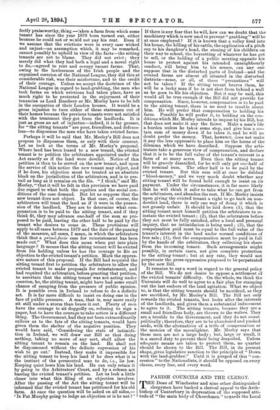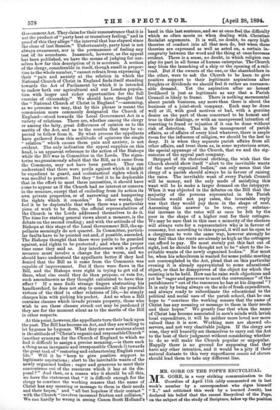PARISH COUNCILS AND THE CLERGY.
THE Dean of Winchester and nine other distinguished clergymen have backed a clerical appeal to the Arch- bishop of Canterbury in deprecation of the supposed atti- tude of "the main body of Churchmen" toviards the Local Government Act. They claim for their remonstrance that it is not the product of " party heat or transitory feeling," and in proof of this they allege " the interval that has elapsed since the close of last Session." Unfortunately, party heat is not always evanescent, nor is the permanence of feeling any test of its soundness. Inasmuch, however, as the appeal has been published, we have the means of judging for our- selves how far this description of it is accurate. A section of the clergy, considerable in itself, though small in propor- tion to the whole number, "cannot refrain from expressing " their " pain and anxiety at the relation in which the National Church of Christ in England finds itself standing towards the Act of Parliament by which it is intended to endow both our agricultural and our London popula- tion with larger and richer opportunities for the full exercise of citizenship." We should have thought that the " National Church of Christ in England "—assuming, as we presume we may, that by this phrase is meant the communion more commonly designated the Church of England—stood towards the Local Government Act in a variety of relations. There are, whether among the clergy or among the laity, great differences of opinion as to the merits of the Act, and as to the results that may be ex- pected to follow from it. By what process the appellants have gathered from this multitude of opinions the single " relation" which causes them pain and anxiety, is not evident. The only indication the appeal supplies on this head, is an apparent reference to the action of the Bishops while the Bill was in Committee in the Lords. The signa- tories magnanimously admit that the Bill, as it came from the Commons, may not have been perfect. They can understand that there were perils against which it might be expedient to guard, and ecclesiastical rights which it was needful to protect. But they " feel it to be deplorable that in the effort to meet these necessities, it should have come to appear as if the Church had no interest or concern in the measure, except that of excluding from its action its own private properties, or of narrowing and hampering the rights which it concedes." In other words, they feel it to be deplorable that when there was a particular piece of work to be done, the official representatives of the Church in the Lords addressed themselves to do it. The time for stating general views about a measure, is the debate on the second reading ; and with the attitude of the Bishops at this stage of the Local Government Bill, the ap- pellants seemingly do not quarrel. In Committee, particu- lar faults have to be pointed out and, if possible, amended. The Bishops thought that there were perils to be guarded against, and rights to be protected ; and when the proper time came they said so. Any interference with a perfect measure must involve a change for the worse, and we should have understood the appellants better if they had denied that the Bill as it came from the Commons was capable of improvement. But if there were flaws in the Bill, and the Bishops were right in trying to get rid of them, what else could they do than propose, or vote for, such amendments as they thought calculated to have this effect ? If a man finds strange fingers abstracting his handkerchief, he does not stop to consider all the possible virtues of the thief in other relations of life,—he simply charges him with picking his pocket. And so when a Bill contains clauses which invade private property, those who wish to see these clauses struck out may be pardoned if they are for the moment silent as to the merits of the Bill in other respects.
At this point, however, the appellants turn their back upon the past. The Bill has become an Act, and they are willing to let bygones be bygones. What they are now anxious about is the attitude of "Christ's organic and responsible Church" (another synonym for the Church of England to which we find it difficult to assign a precise meaning,—is there such a thing as an inorganic and irresponsible Church ?) towards the great task of " restoring and enheartening English rural life." Will it be " keen to give positive support to legitimate aspirations ; alert to the inevitable wants of the newly organised bodies ; eager and generous to meet their convenience out of the resources which it has at its dis- posal ? And then, as a reason why it should be all this, we have the statement that " it is difficult enough for the clergy to convince the working masses that the name of Christ has any meaning or message to them in their needs and their hopes," and " all but hopeless if their contact " with the Church " involves incessant friction and collision." We can hardly be wrong in seeing Canon Scott Holland's hand in this last sentence, and-we at once feel the difficulty which so often meets us when dealing with Christian Socialist arguments. It is well, no doubt, to carry high theories of conduct into all that men do, but when these theories are expressed as well as acted on, a certain in- congruity between the word and the thing at once becomes evident. There is a sense, no doubt, in which religion can play its part in all forms of human enterprise. The Church may bless the launching of a ship or the opening of a rail- road. But if the owners of the one, or the shareholders in the other, were to ask the Church to be keen to give positive support to their legitimate aspirations after freights or dividends we should feel it rather an unreason- able demand Yet the aspiration after an honest livelihood is just as legitimate as any that a Parish Council is likely to frame. There is nothing sacramental about parish business, any more than there is about the business of a joint-stock company. Each may be done well or ill, with good motives or bad, with a genuine desire on the part of those concerned to be honest and true in their dealings, or with an unexpressed intention of resorting to fraud or injustice if it can be done without risk of detection. That in the management of parish affairs, as of affairs of every kind whatever, there is ample room for the influence of religion, we should be the last to deny. It is when they separate parish affairs from all other affairs, and treat them as, in some mysterious sense, the special appanage of the Church, that we and the sig- natories of the appeal part company.
Stripped of its rhetorical clothing, the wish that the Church should show itself " alert to the inevitable wants of the newly organised bodies," can only mean that the clergy of a parish should always be in favour of raising the rates. The inevitable want of every Parish Council will be money, and the only mode of satisfying this want will be to make a larger demand on the ratepayer. When it was objected in the debates on the Bill that the majority of the persons represented in the Parish Councils would not pay rates, the invariable reply was that they would pay them in the shape of rent. Assuming this answer to be true, every substan- tial increase in the rates will at once be felt by the poor in the shape of a higher rent for their cottages. We may be sure that in this case a minority of the electors will always vote for a representative who is in favour of economy, but according to this appeal, it will not be open to a clergyman to vote the same way, however strongly he may feel that the rents are already as high as the cottagers can afford to pay. He must sternly put this fact out of sight, lest he should be thought not to be " alert to the in- evitable wants of the newly organised bodies." Nor must he, when his schoolroom is wanted for some public meeting not contemplated in the Act, plead that on this particular evening it is already appropriated to some educational object, or that he disapproves of the object for which the meeting is to be held. How can he raise such objections and yet be " eager and generous to meet the convenience " of the parishioners " out of the resources he has at his disposal " ? It is only by being always on the side of fresh expenditure, and always ready to subordinate the educational to the political and social uses of the parish school, that he can hope to " convince the working masses that the name of Christ has any meaning or message to them in their needs and their hopes." We greatly fear that when the name of Christ has become associated in men's minds with lavish local expenditure, it will be neither more loved nor more valued than it is now. Working men are shrewd ob- servers, and not very charitable judges. If the clergy are wise, they will honestly set themselves to carry out the Act to the best of their judgment without considering whether to do so will make the Church popular or unpopular. Happily there is no ground for supposing that they have any other intention, and it would be a pity if their natural distaste to this very superfluous concio ad clown should lead them to take any different line.



















































 Previous page
Previous page